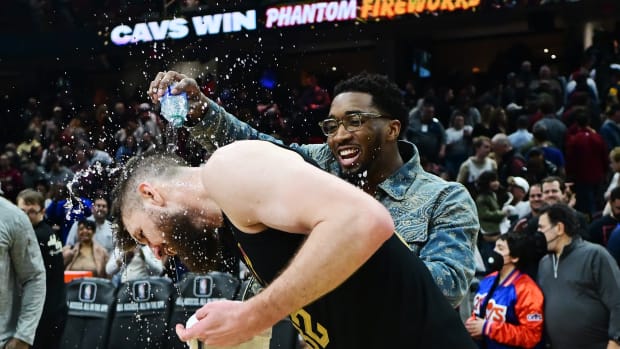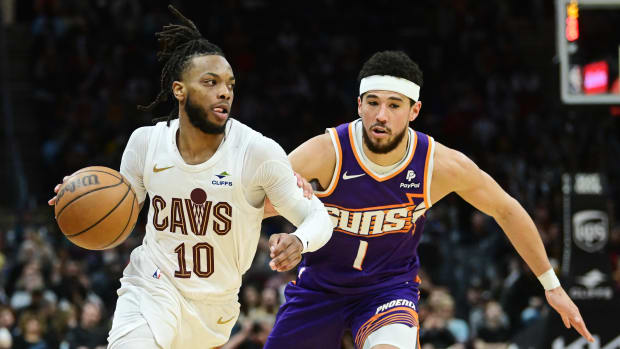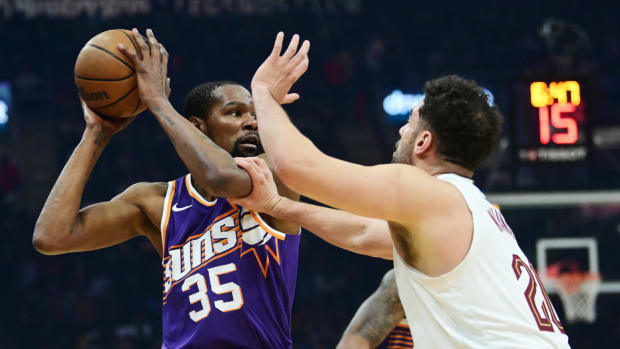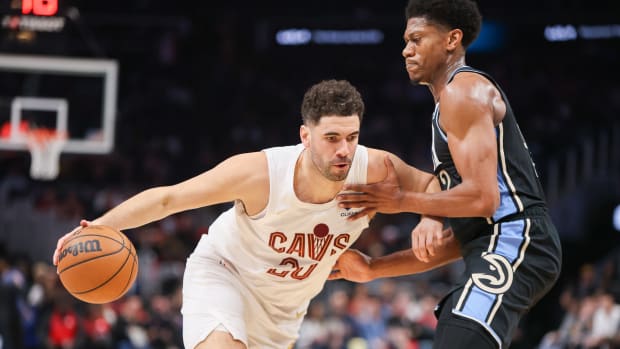Interview: Walsh talks NBA past, present
Last October, I interviewed Jimmy Powell, an advanced scout for the Indiana Pacers. Jimmy has been around the NBA game for decades. He's scouted generations of talent and worked for a number of different men. He's seen it all. And so when Jimmy told me that Donnie Walsh is far and away the most brilliant basketball mind he had encountered, I took pause.
Walsh is currently a consultant of basketball operations for the Pacers. But most NBA fans recall him presiding over the Pacers as CEO and President for an era defined by winning basketball -- the Pacers made the playoffs in 16 of his 17 years as the CEO and President.
Walsh has spent nearly four decades in the NBA. His career began in 1979 as a Denver Nuggets assistant coach. Given the longevity and consistent success of his teams, Walsh is arguably the active reigning authority of the NBA.
I spoke to Walsh earlier this month. Before asking a single question, I admitted to him that I had no defined agenda, no grand vision, no too-smart-by-half plan for our interview. I simply wanted to pick the brain of a man whose respect throughout NBA circles is unquestioned, and who has built good -- and sometimes great -- teams year-in and year-out.
He laughed and graciously told me that he had no agenda either and would simply answer the questions I asked. Disarmed, I thought that sounded fair enough and fired away.
What follows is a meandering back and forth with Walsh, a discussion that ranges from his days at the University of North Carolina under a first year coach named Dean Smith to his time in the Big Apple working for James Dolan restoring order to the NBA's crown jewel franchise.
A sea of names peppered our conversation, from Jerry West to Reggie Miller, from Oscar Robertson to Raymond Felton. It was a voluminous talk, and I’ve preserved it in near totality. So I hope you enjoy reading the recollections of a basketball legend as much as I enjoyed listening.
JK:You were a senior on Dean Smith's first varsity team at North Carolina in 1961. If it's possible to suspend the beauty of hindsight, can you tell me what you recall of playing for Coach Smith that year?
Walsh: I’ve thought about this a lot. I remember clearly when I came in as a freshman, school was about to start, and Dean brought me to the "Tin Can," a building with a tin roof, kind of out in the woods with a basketball court in it. He was the freshman coach at this time. So he takes me and two other freshman and immediately starts coaching us on defense, just defense. I remember thinking, “I’ve never heard of some of the stuff he’s talking about.” That was the beginning for me. From day one with Dean, I realized that I didn’t know a lot about the game. I remember feeling that way quite a bit the first year.
JK: Are there any principles that Dean taught and you carried into your professional life?
Walsh: Dean had an all-encompassing view of the game. It started with defense, and he was years ahead of his time, because his defenses could switch styles at any time and without pause. So, we could start out in man-to-man, then graduate to running and jumping to double teams to zone. He had multiple defenses that could all change into the other at any time, at any place on the court.
The other thing about Dean is that he timed his practices to the second. So, if you looked on his practice sheet, you would see a water break was scheduled for 3:35:30 and then the next drill would start at 3:37. So we had exactly a minute and a half to get water.
But the most important thing about Dean? He was just a nice, nice man.
JK: Listening to you recall some of the details from that time, it sounds like Dean Smith was a mentor to you. Is that fair to say?
Walsh: He was a life mentor. There aren’t too many coaches like Dean. He has had former players who tried to emulate him as coaches, and they might get part of it – his commitment to defensive pressure, running, maybe some ball movement principles, part of it – but it’s pretty hard to replicate all of it.
JK: Is there anyone that you have mentored?
Walsh: I have no idea. I’ve been in the front office and worked with people who said they enjoyed working with me. But I have no idea.
JK: Jimmy Powell told me that you went to law school, and he seemed to think that set you apart as a basketball man. Did your training in law school shape you as an NBA coach or GM?
Walsh: That’s kind of a different story. It definitely helped me. Studying the law teaches your mind how to work. I think I approach things with my education as an influence.
JK: You were taken in the 11th round of the 1962 NBA draft by the San Francisco Warriors but never played a minute in the NBA. Why not?
Walsh: I went to law school instead because I knew I wasn’t good enough to play professional basketball. Back in those days, there weren’t many roster spots, and even first round picks didn’t always make the team. So I knew I wasn’t good enough. Frank McGuire was the coach, and he had coached me before, so I think he kind of did me a favor by picking me at all.
JK: In 1987, you drafted Reggie Miller over hometown favorite and Indiana University star Steve Alford. I have to imagine that was unpopular with the fan base and local media. Was that a simple decision or did you feel pressure to draft Alford?
Walsh: Yeah, there was some public blowback to that decision. But it actually happened a year earlier when I took Chuck Person, I think number four overall. People didn’t like that pick either. But (laughing), Chuck was rookie of the year, so the writers didn’t go after me too hard for the Miller pick. But yes, a lot of people thought I should or would take Alford. I took Reggie.
I was actually looking for a point guard in that draft, though. I really wanted Kevin Johnson, but I heard early on that Cleveland would probably take him, so then I focused on Reggie. But before making a decision, I gave tape of Reggie to Jack Ramsay and asked him to take a look. He came back and said he liked him. That was it. I kept it quiet but knew Reggie was our guy.
JK: That doesn’t sound too dramatic.
Walsh: It was a typical draft. But there was a lot of talk about Reggie coming out of college. They said he was brash. There was a story that he spit on a player. Before the draft, we actually had Reggie and Kevin Johnson visit on the same day. It was different then, but I had those two guys visit just so I could get to know them a little bit before the draft. Anyway, Kevin (Johnson) is a very nice guy, very articulate. And Reggie was actually very shy. He wasn’t talking much. And Kevin saw that and kind of brought Reggie into our conversation. Kevin really helped me to get to know Reggie better that day.
JK: That’s really funny to hear you say he was shy because I don’t think most people who watched him as a player or listen to him now as a broadcaster would use the word “shy” to describe Reggie Miller.
Walsh: Right, well that’s his public persona. If you get to know him, like anyone, he’s different than what you think you know.
And about that story that he spit on a guy in college, I asked him about it. He told me, “Yeah, I spit on the guy.” I asked him why. He said the guy had spit on his teammate. And (laughing) I just said, “Oh, OK.”
JK: I don’t know how interested you are in talking about your time in New York, but . . .
Walsh: That got blown out of proportion. I won’t talk about the owner. It’s not proper to talk about a man who pays you to do a job. I liked him, and it was a very good experience. I grew up in New York, so I understood it, I got it. My time there was great, and I enjoyed it.
JK: OK, you may have just answered or invalidated a few of the questions I had about New York, the Carmelo Anthony trade . . .
Walsh: In the Carmelo trade, Denver was trying to hit a home run, which makes sense. I really wanted Carmelo. I just thought he had tremendous ability. So I knew I had to give up a lot, but there are certain moments before a trade when you have to ask yourself, “Just how bad do I want this player?” I ended up giving Denver a few guys that I really thought would be great role players for us, (Raymond) Felton and (Timofey) Mozgov. I just thought they fit our team well, and I didn’t really understand why Denver wanted them. I didn’t see how they would fit with Denver, so it was hard to give them up not because they were great but because I didn’t understand the need from Denver. And I don’t know what Felton’s doing now, Mozgov is with the Cavs, but they ended up getting rid of both of them which kind of proves my point.
JK: So it sounds like New York was a generally fulfilling experience?
Walsh: Yeah, I spent two years trying to get the cap in order. One thing I needed to do but didn’t is beef up the top 8 (players on the roster). We had Melo and we had Amare (Stoudemire) but not much else. That’s why I didn’t want to give up Felton and Mozgov. I thought they were good players who would fit well with our two stars. After I left, they got the big kid (Tyson) Chandler and actually turned into a great team.
Working in New York is a 24/7 job. I love the New York people because they love basketball. Yeah, they love the Yankees because they win, but they really love basketball in New York – there are courts on every school yard in the city. It’s a special there. It’s almost a personal relationship that New Yorkers have with basketball. Look at the Garden, it’s always full. That city knows basketball.
JK: Do you like where the Knicks are at now?
Walsh: I do. Phil (Jackson), I think, had a lot of pressure right away to go get big free agents. That isn’t easy to do. I knew when he took (Kristaps) Porzingas that he got a really good player. A really good player. And what I didn’t do in New York, Phil is doing, getting that top 8 – he went out and got (Aaron) Afflalo, that kind of player, he got (Robin) Lopez. These are two good players to pair with a star like Melo.
I knew Melo would be great in the triple post offense, too. Because he really can do everything. Shoot, rebound, he’s not a bad passer. But what most people don’t realize or believe is that he’s a very good defender when he puts his mind to it. If you match him up in crunch time on another good offensive player, he will give you a great effort.
JK: I read that when you were President of Basketball Operations you traveled to all the away games. Is that true and is it unique?
Walsh: I did travel quite a bit to those games. I wanted to be around the team as much as possible, especially in the beginning and if we had a lot of young guys. I wanted our team to know I was watching. But I also wanted to see the rest of the league – as President, I liked to see what other teams were doing in the arena and with advertising and that kind of thing.
JK: You’ve spent almost 40 years in the NBA. Certainly the game has changed and transformed, but can you identify some common principles of great teams or players that have endured throughout your time in the league?
Walsh: The league has changed, sure. Now you’re getting athletic talent that is better than when I came into the league. But the flip side is when I first entered the NBA as a coach, the players were older and more experienced. You had four year college players who had been coached by great coaches. They came in with a lot more know-how than a player would today. I remember as an assistant to Larry Brown back when I first began, the players would actually teach me about the pro game.
JK: Larry Brown is another guy who has been around the game seemingly forever.
Walsh: Larry is a unique guy. He can be conducting practice, blow the whistle, walk onto the court and go up to one guy. And he will tell that guy everything he did wrong during a certain moment of play. And then he will go around and do the same thing with every player, offense and defense. He can literally blow the whistle and tell every player on the court what they were doing and where they were situated during any play. He can basically take a mental snapshot of any given play or sequence on a court.
Larry is to me as good as it gets. He’s really unbelievable, this guy. He goes to SMU, in two years they win the conference and go to the NCAA tournament – where they lost on an unbelievable goal tend call at the buzzer. The school is now spending something like $50 million to renovate the arena, and that’s because of Larry. By the way, this guy (Larry Brown) is older than me! He was born to coach and will probably do it until he dies.
JK: Who are your favorite non-Pacer players to watch in today’s game?
Walsh: There are a lot of them. Some of these young guys are so talented and they know how to play. (Kevin) Durant is a phenomenal player. If you put him in the league back when I first came in, we just didn’t have guys that big who could dribble, pull up and shoot from anywhere. They would have beat him to a pulp, though, I’ll say that.
(Russell) Westbrook, too. He’s a point guard who’s actually stronger than most of the big guys and can easily dunk on all of them. An incredible talent.
JK: I have to ask about LeBron. He’s a guy that most everyone recognizes as the best in the game. What do you think?
Walsh: He can do it all. I don’t know how to say it – he is just on another level. If you built a player, you would use his body, his athleticism, and his desire to be great. He has turned into the consummate pro with his ability to accept that the team wins only if he provides the creative spark every night. To me, LeBron is the 6’8”, 260 pound version of Michael Jordan.
JK: That’s interesting because it seems like he is more often compared to Magic than Jordan.
Walsh: Like Jordan, whatever has to be done to win, LeBron can do it. He’s a great scorer. That almost gets lost because he does so many other things so well.
But you know, don’t ask me who was better, who’s the best. When guys like LeBron and Michael (Jordan) get to that level, they’re all just great. Larry (Bird), Magic, Jerry West – people don’t realize how good West and Oscar Robertson were, forget Bird and Magic.
It’s far more interesting to me to wonder what makes a team win than it is to wonder who the best player is. It’s always more than one player that matters on a great team.
JK: Speaking of great teams, why is Golden State so good, is there something subtle they do that has them on pace to make history?
Walsh: Well, the obvious is that Stephen Curry and Klay Thompson can shoot it. Curry has incredible vision. Curry has more physical skills than it seems like he gets credit for – his quickness and skill level is really incredible. Thompson is underrated as an athlete, too. He’s a great athlete, the same kind of ability as Durant.
Also, those two, Curry and Thompson, if you see these guys come down the court, they never get hit. They avoid contact so well. Thompson, especially, he doesn’t let guys play him physically. They try. He doesn’t let them. And it’s not macho stuff, he isn’t matching them with physicality, it’s just quickness. Before they can body him, like that, he’s just gone.
So those are two great players. But what makes them win? Draymond Green. He makes them win. He dribbles, defends, rebounds – he makes them win. You must have a guy like that if you want to spread the floor but also defend big guys at the other end.
JK: I remember watching Draymond Green in college and thought of him more as a post player, a really nice college ball player who would probably struggle to stick in the NBA.
Walsh: In college, I thought Draymond was a tweener. I didn’t follow his team around, but the games I saw, I thought he might not be quick enough to play small forward or big enough to play power forward. Well, now he plays where he wants to play! He’s very tough.
JK: Are you satisfied with the state of the NBA game today?
Walsh: The values I learned from Dean Smith are being used by NBA coaches today. The pro game is certainly different than the game Dean coached back in 1961, but the teams that win now know the same thing as teams that won back then – guys who aren’t stars are needed to win the game. Curry knows he can’t win without Iguodala. Great teams and great players know this.
The rule changes have certainly sped the game up, and it’s great for the league. The athletes we have now are so amazing. These kids can just do some special things. Like LeBron, so big and fast but under control. The game is fine.
Twitter: @JKaslerHoops.




